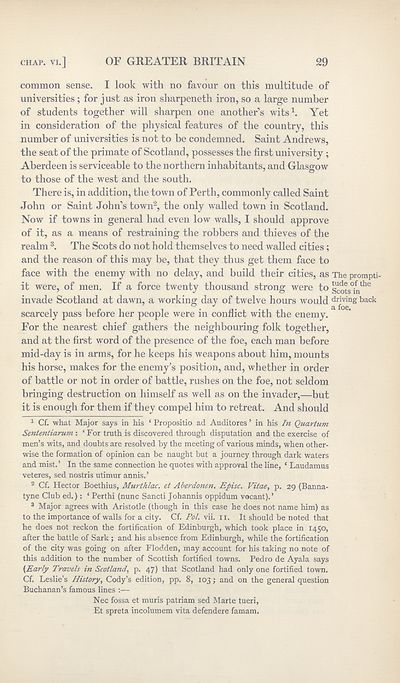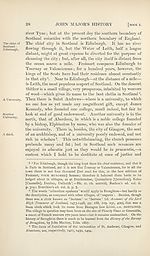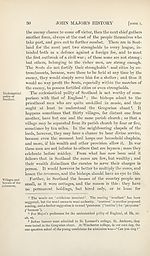Series 1 > History of Greater Britain, as well England as Scotland
(174) Page 29
Download files
Complete book:
Individual page:
Thumbnail gallery: Grid view | List view

OF GREATER BRITAIN
29
CHAP. VI.]
common sense. I look with no favour on this multitude of
universities; for just as iron sharpeneth iron, so a large number
of students together will sharpen one another’s wits1. Yet
in consideration of the physical features of the country, this
number of universities is not to be condemned. Saint Andrews,
the seat of the primate of Scotland, possesses the first university;
Aberdeen is serviceable to the northern inhabitants, and Glasgow
to those of the west and the south.
There is, in addition, the town of Perth, commonly called Saint
John or Saint John’s town2, the only walled town in Scotland.
Now if towns in general had even low walls, I should approve
of it, as a means of restraining the robbers and thieves of the
realm 3. The Scots do not hold themselves to need walled cities;
and the reason of this may be, that they thus get them face to
face with the enemy with no delay, and build their cities, as The prompti-
it were, of men. If a force twenty thousand strong were to Scots^n1*16
invade Scotland at dawn, a working day of twelve hours would driving back
scarcely pass before her people were in conflict with the enemy.
For the nearest chief gathers the neighbouring folk together,
and at the first word of the presence of the foe, each man before
mid-day is in arms, for he keeps his weapons about him, mounts
his horse, makes for the enemy’s position, and, whether in order
of battle or not in order of battle, rushes on the foe, not seldom
bringing destruction on himself as well as on the invader,—but
it is enough for them if they compel him to retreat. And should
1 Cf. what Major says in his ‘ Propositio ad Auditores ’ in his /« Quartum
Sententiaruni: ‘For truth is discovered through disputation and the exercise of
men’s wits, and doubts are resolved by the meeting of various minds, when other¬
wise the formation of opinion can be naught but a journey through dark waters
and mist.’ In the same connection he quotes with approval the line, ‘ Laudamus
veteres, sed nostris utimur annis.’
2 Cf. Hector Boethius, Murtklac. et Aberdonen. Episc. Vitae, p. 29 (Banna-
tyne Club ed.): ‘ Perthi (nunc Sancti Johannis oppidum vocant).’
3 Major agrees with Aristotle (though in this case he does not name him) as
to the importance of walls for a city. Cf. Pol. vii. 11. It should be noted that
he does not reckon the fortification of Edinburgh, which took place in 1450,
after the battle of Sark; and his absence from Edinburgh, while the fortification
of the city was going on after Flodden, may account for his taking no note of
this addition to the number of Scottish fortified towns. Pedro de Ayala says
(Early Travels in Scotland, p. 47) that Scotland had only one fortified town.
Cf. Leslie’s History, Cody’s edition, pp. 8, 103; and on the general question
Buchanan’s famous lines :—
Nec fossa et muris patriam sed Marte tueri,
Et spreta incolumem vita defendere famam.
29
CHAP. VI.]
common sense. I look with no favour on this multitude of
universities; for just as iron sharpeneth iron, so a large number
of students together will sharpen one another’s wits1. Yet
in consideration of the physical features of the country, this
number of universities is not to be condemned. Saint Andrews,
the seat of the primate of Scotland, possesses the first university;
Aberdeen is serviceable to the northern inhabitants, and Glasgow
to those of the west and the south.
There is, in addition, the town of Perth, commonly called Saint
John or Saint John’s town2, the only walled town in Scotland.
Now if towns in general had even low walls, I should approve
of it, as a means of restraining the robbers and thieves of the
realm 3. The Scots do not hold themselves to need walled cities;
and the reason of this may be, that they thus get them face to
face with the enemy with no delay, and build their cities, as The prompti-
it were, of men. If a force twenty thousand strong were to Scots^n1*16
invade Scotland at dawn, a working day of twelve hours would driving back
scarcely pass before her people were in conflict with the enemy.
For the nearest chief gathers the neighbouring folk together,
and at the first word of the presence of the foe, each man before
mid-day is in arms, for he keeps his weapons about him, mounts
his horse, makes for the enemy’s position, and, whether in order
of battle or not in order of battle, rushes on the foe, not seldom
bringing destruction on himself as well as on the invader,—but
it is enough for them if they compel him to retreat. And should
1 Cf. what Major says in his ‘ Propositio ad Auditores ’ in his /« Quartum
Sententiaruni: ‘For truth is discovered through disputation and the exercise of
men’s wits, and doubts are resolved by the meeting of various minds, when other¬
wise the formation of opinion can be naught but a journey through dark waters
and mist.’ In the same connection he quotes with approval the line, ‘ Laudamus
veteres, sed nostris utimur annis.’
2 Cf. Hector Boethius, Murtklac. et Aberdonen. Episc. Vitae, p. 29 (Banna-
tyne Club ed.): ‘ Perthi (nunc Sancti Johannis oppidum vocant).’
3 Major agrees with Aristotle (though in this case he does not name him) as
to the importance of walls for a city. Cf. Pol. vii. 11. It should be noted that
he does not reckon the fortification of Edinburgh, which took place in 1450,
after the battle of Sark; and his absence from Edinburgh, while the fortification
of the city was going on after Flodden, may account for his taking no note of
this addition to the number of Scottish fortified towns. Pedro de Ayala says
(Early Travels in Scotland, p. 47) that Scotland had only one fortified town.
Cf. Leslie’s History, Cody’s edition, pp. 8, 103; and on the general question
Buchanan’s famous lines :—
Nec fossa et muris patriam sed Marte tueri,
Et spreta incolumem vita defendere famam.
Set display mode to:
![]() Universal Viewer |
Universal Viewer | ![]() Mirador |
Large image | Transcription
Mirador |
Large image | Transcription
Images and transcriptions on this page, including medium image downloads, may be used under the Creative Commons Attribution 4.0 International Licence unless otherwise stated. ![]()
| Scottish History Society volumes > Series 1 > History of Greater Britain, as well England as Scotland > (174) Page 29 |
|---|
| Permanent URL | https://digital.nls.uk/127733853 |
|---|
| Attribution and copyright: |
|
|---|
| Description | Over 180 volumes, published by the Scottish History Society, containing original sources on Scotland's history and people. With a wide range of subjects, the books collectively cover all periods from the 12th to 20th centuries, and reflect changing trends in Scottish history. Sources are accompanied by scholarly interpretation, references and bibliographies. Volumes are usually published annually, and more digitised volumes will be added as they become available. |
|---|


